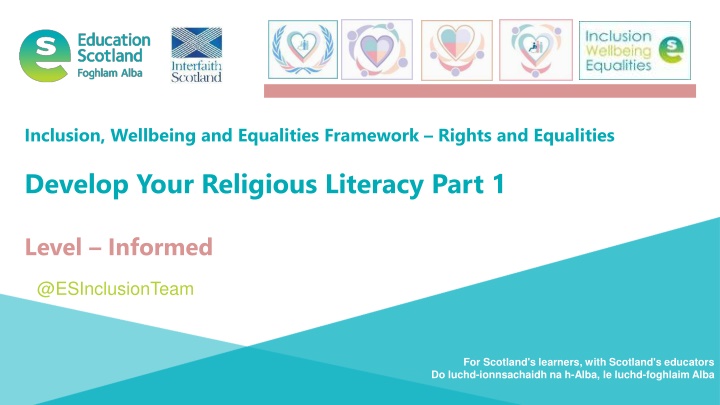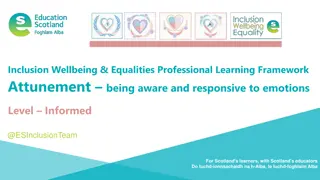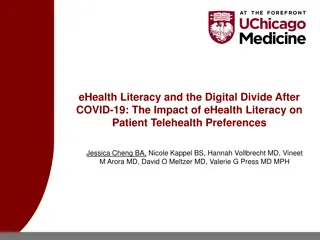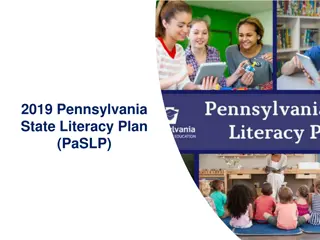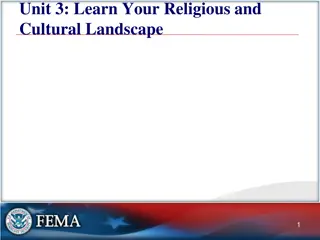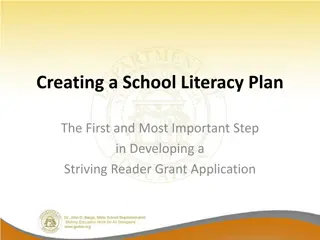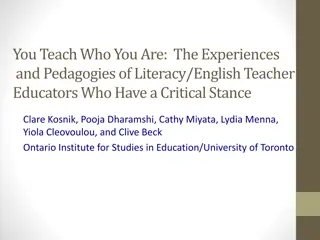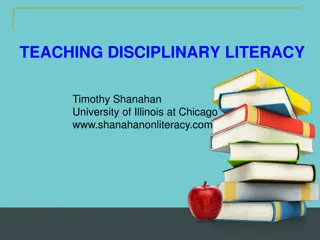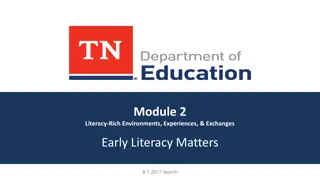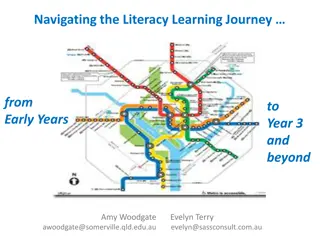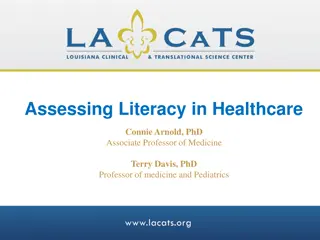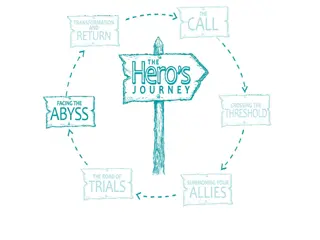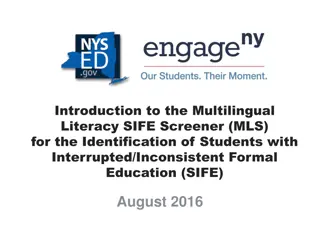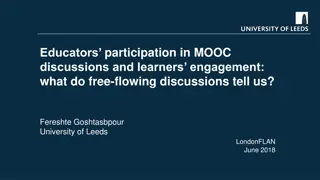Developing Religious Literacy for Educators in Scotland
This resource aims to enhance educators' understanding of religious literacy by exploring religious discrimination, core beliefs of major faiths, and additional learning sources. It encourages educators to consider the needs of learners in relation to their religious beliefs in Scotland.
Download Presentation

Please find below an Image/Link to download the presentation.
The content on the website is provided AS IS for your information and personal use only. It may not be sold, licensed, or shared on other websites without obtaining consent from the author.If you encounter any issues during the download, it is possible that the publisher has removed the file from their server.
You are allowed to download the files provided on this website for personal or commercial use, subject to the condition that they are used lawfully. All files are the property of their respective owners.
The content on the website is provided AS IS for your information and personal use only. It may not be sold, licensed, or shared on other websites without obtaining consent from the author.
E N D
Presentation Transcript
Inclusion, Wellbeing and Equalities Framework Rights and Equalities Develop Your Religious Literacy Part 1 Level Informed @ESInclusionTeam For Scotland's learners, with Scotland's educators For Scotland's learners, with Scotland's educators Do luchd-ionnsachaidh na h-Alba, le luchd-foghlaim Alba For Scotland's learners, with Scotland's educators Do luchd-ionnsachaidh na h-Alba, le luchd-foghlaim Alba Do luchd-ionnsachaidh na h-Alba, le luchd-foghlaim Alba
Pause for Thought How to use this resource These slides can be used to facilitate professional learning in a group or whole- setting, or as a self-directed learning activity as an individual. Facilitation notes are included at the bottom of each slide Please do not remove or change any of the slides included. Facilitators are welcome to add slides or activities relevant to your own setting, to support discussion and exploration of the topic. Facilitators will know their participants needs best. Anyone who works in an educational setting can be a facilitator and use these slides. For reflection or discussion activities, it is important to establish a safe space which encourages respect and honesty to ensure that everyone is able to participate. For Scotland's learners, with Scotland's educators Do luchd-ionnsachaidh na h-Alba, le luchd-foghlaim Alba Do luchd-ionnsachaidh na h-Alba, le luchd-foghlaim Alba For Scotland's learners, with Scotland's educators
IWE Professional Learning Framework For Scotland's learners, with Scotland's educators Do luchd-ionnsachaidh na h-Alba, le luchd-foghlaim Alba Do luchd-ionnsachaidh na h-Alba, le luchd-foghlaim Alba For Scotland's learners, with Scotland's educators
National Model for Professional Learning This professional learning resource will support you to deepen your knowledge and understanding. You will have the opportunity to consider how to take this learning forward on your own and with others. The National Model of Professional Learning (education.gov.scot) For Scotland's learners, with Scotland's educators Do luchd-ionnsachaidh na h-Alba, le luchd-foghlaim Alba Do luchd-ionnsachaidh na h-Alba, le luchd-foghlaim Alba For Scotland's learners, with Scotland's educators
Pause for Thought Welcome This session provides an opportunity to help you develop your religious literacy by: Considering religious discrimination and bullying. Introducing the core beliefs of the six main faiths in the UK (Buddhism, Christianity, Hinduism, Islam, Judaism, and Sikhism). Identifying sources of additional learning about each faith. Helping you consider the needs of learners relating to their religious beliefs. For Scotland's learners, with Scotland's educators Do luchd-ionnsachaidh na h-Alba, le luchd-foghlaim Alba Do luchd-ionnsachaidh na h-Alba, le luchd-foghlaim Alba For Scotland's learners, with Scotland's educators
Pause for Thought Religious Discrimination and Bullying What is it and what is its relevance to public bodies? For Scotland's learners, with Scotland's educators Do luchd-ionnsachaidh na h-Alba, le luchd-foghlaim Alba Do luchd-ionnsachaidh na h-Alba, le luchd-foghlaim Alba For Scotland's learners, with Scotland's educators
What is religious discrimination? Religious discrimination can include: being treated differently because of a person s religion, perceived religion or lack of religion or beliefs. incidents when people make wrong assumptions about a person s religion. Learners, staff, families and wider community members might be at risk of experiencing religious discrimination. For Scotland's learners, with Scotland's educators Do luchd-ionnsachaidh na h-Alba, le luchd-foghlaim Alba Do luchd-ionnsachaidh na h-Alba, le luchd-foghlaim Alba For Scotland's learners, with Scotland's educators
What is religious bullying? Religious bullying can happen when people say hurtful things or actions because of a person s religion. This can include being bullied about: their name, religious practices such as not eating meat or drinking alcohol, religious clothing and symbols such as headscarf, cross or kara. It could include trying to remove religious clothing or symbols. It can also include being pressured into doing things that people know are against the person s religion. For Scotland's learners, with Scotland's educators Do luchd-ionnsachaidh na h-Alba, le luchd-foghlaim Alba Do luchd-ionnsachaidh na h-Alba, le luchd-foghlaim Alba For Scotland's learners, with Scotland's educators
What is the relevance to public bodies? Religion and belief are a protected characteristic under the Equality Act 2010. The Public Sector Equality Duty requires all public bodies (including many education settings) to take steps to eliminate discrimination. The Hate Crime Strategy for Scotland 2023 protects people experiencing hate crime based on prejudice towards people based on religion or perceived religious identity. For Scotland's learners, with Scotland's educators Do luchd-ionnsachaidh na h-Alba, le luchd-foghlaim Alba Do luchd-ionnsachaidh na h-Alba, le luchd-foghlaim Alba For Scotland's learners, with Scotland's educators
PROVOCATION We get taught about how to appreciate Scotland and a lot about things in a Christian way, but I am Muslim, not Christian. I don t get taught anything about my culture and neither does anyone in my school . the teacher usually puts it on me to educate other people which is not fair, and it makes me feel even more like I am not included. (Secondary school age learner) (p.20) Putting Learners at the Centre: Towards a Future Vision for Scottish Education (www.gov.scot) For Scotland's learners, with Scotland's educators Do luchd-ionnsachaidh na h-Alba, le luchd-foghlaim Alba Do luchd-ionnsachaidh na h-Alba, le luchd-foghlaim Alba For Scotland's learners, with Scotland's educators
Pause for Thought Core beliefs of the main faiths We will be exploring the six largest faiths in the UK: Buddhism, Christianity, Hinduism, Islam, Judaism, and Sikhism. We can only cover the most basic information about each faith, please follow the links at the end to continue your learning on each one. Remember that with any faith, two people who follow the same faith may have quite different beliefs and customs. Religious belief and cultural attitudes & norms can be difficult to separate. For Scotland's learners, with Scotland's educators Do luchd-ionnsachaidh na h-Alba, le luchd-foghlaim Alba Do luchd-ionnsachaidh na h-Alba, le luchd-foghlaim Alba For Scotland's learners, with Scotland's educators
Religion / Belief Linguistic Pause for Thought Ethnic/Cultural/Racial Socioeconomic Diversity Disability Gender/Sex Neurodiversity Sexual Orientation Family Age For Scotland's learners, with Scotland's educators Do luchd-ionnsachaidh na h-Alba, le luchd-foghlaim Alba Do luchd-ionnsachaidh na h-Alba, le luchd-foghlaim Alba For Scotland's learners, with Scotland's educators
Pause for Thought Buddhists and Buddhism Siddhartha Gautama, the Buddha , is the faith s founder Buddhism teaches the means by which anyone can achieve enlightenment a state of profound inner peace and recognition of the connectedness of everything Followers believe that suffering is rooted in our wants and desires Meditation is often practised as a means of calming the mind and deepening compassion Non-violence is a key principle, and Buddhists will typically be vegetarian/ vegan and avoid killing or harming any animal or person For Scotland's learners, with Scotland's educators Do luchd-ionnsachaidh na h-Alba, le luchd-foghlaim Alba Do luchd-ionnsachaidh na h-Alba, le luchd-foghlaim Alba For Scotland's learners, with Scotland's educators
Holding onto anger is like drinking poison and expecting the other person to die Buddha 14
Pe for Thought Christians and Christianity Christianity developed 2000 years ago in what is now Israel. Its founder is Jesus Christ, who Christians believe to be the Son of God and the Messiah. Christians believe in one God, with three elements: Father, Son and Holy Spirit The holy book is the Bible (both New and Old Testaments) The faith emphasises love for all people and Christians are encouraged to love thy neighbour as thyself The cross is a sacred symbol commemorating Jesus death and resurrection and God s forgiveness of sins For Scotland's learners, with Scotland's educators Do luchd-ionnsachaidh na h-Alba, le luchd-foghlaim Alba Do luchd-ionnsachaidh na h-Alba, le luchd-foghlaim Alba For Scotland's learners, with Scotland's educators
Let all that you do be done in Love 1 Corinthians 16:14
Pause for Thought Hindus and Hinduism Hinduism developed many thousand years ago in India. It has no single founder and there is wide variation of beliefs & practices among Hindus. Hindus worship a large pantheon of gods, including Brahma, Vishnu and Shiva. Each one is considered an expression of the one God Brahman Hindus believe in Karma: the sum of your actions influence your future fate The soul is immortal and after death we will be reborn Often vegetarian, Hindus are expected not eat beef as cows are considered sacred For Scotland's learners, with Scotland's educators Do luchd-ionnsachaidh na h-Alba, le luchd-foghlaim Alba Do luchd-ionnsachaidh na h-Alba, le luchd-foghlaim Alba For Scotland's learners, with Scotland's educators
One should perform karma without expecting the benefits, because sooner or later one shall definitely get the fruits. -The Rig Veda 18
Pause for Thought Muslims and Islam Islam was founded by the Prophet Muhammad. Muslims worship one God (in Arabic Allah ) The holy book is called the Quran There are five Pillars of Islam : the declaration of faith; giving to charity; praying 5 times a day; fasting during the month of Ramadan; and the pilgrimage to Mecca Muslims are expected not to eat pork, or other meat that is not halal Alcohol is forbidden in Islam Some Muslim women will wear a headscarf called a hijab which covers the head and neck, or a niqab which also covers the nose and mouth For Scotland's learners, with Scotland's educators Do luchd-ionnsachaidh na h-Alba, le luchd-foghlaim Alba Do luchd-ionnsachaidh na h-Alba, le luchd-foghlaim Alba For Scotland's learners, with Scotland's educators
Be the flower that gives its fragrance to even the hand that crushes it Ali Ibn Abu Talib 20
Pause for Thought Jews and Judaism Jewish people believe in one God and try to live according to his Commandments. There are 613 such Mitzvot total, including the 10 Commandments. Orthodox Jews strictly follow Jewish laws and traditions. Non-orthodox Jews will follow some customs, but not all. Orthodox Jews are expected to only eat kosher food Pork is forbidden in any form Shabbat (Sabbath): Friday evening to Saturday evening. Many Jews will not work, travel or cook during this time. Strict adherents will not answer a phone or use anything electrical during the Shabbat For Scotland's learners, with Scotland's educators Do luchd-ionnsachaidh na h-Alba, le luchd-foghlaim Alba Do luchd-ionnsachaidh na h-Alba, le luchd-foghlaim Alba For Scotland's learners, with Scotland's educators
Just as love blindfolds you and you see no faults, so hate blindfolds you and you see no virtues Moshe Ben Ezra 22
Sikhs and Sikhism Pause for Thought Sikhism developed in India in the 15th Century and was founded by Guru Nanak. Sikhs believe in one God, and equality is a core principle Sikhs believe in charity and offer free food (called Langar ) to all at their temples (called Gurdwaras ) Baptised Sikhs are expected to wear five articles of faith the five Ks These include not cutting your hair or beard, wearing a turban, bangle, and traditional shorts and carrying the Kirpan (a symbolic sword) Traditionally all men have the surname Singh (meaning lion) and women have Kaur (meaning princess) Typically, Sikhs are expected to be vegetarian and avoid alcohol and tobacco For Scotland's learners, with Scotland's educators Do luchd-ionnsachaidh na h-Alba, le luchd-foghlaim Alba Do luchd-ionnsachaidh na h-Alba, le luchd-foghlaim Alba For Scotland's learners, with Scotland's educators
Love me when I least deserve it, because that s when I really need it. Sri Guru Granth Sahib 24
Pause for Thought Discussing a person s faith and beliefs An approach of respectful curiosity is best. Most problems stem from misunderstanding and assumption. People who have been victimised for their faith may be wary about being asked about it, but if we start by saying that we are keen to meet any needs connected to their religion then typically people respond openly. Diversity within groups: it is important to recognise both commonality and individuality. Remember that there are many different beliefs and practices among those who follow the same religion. Telling someone that their interpretation, belief or practice is wrong because it is different from others of the same faith is never helpful. For Scotland's learners, with Scotland's educators Do luchd-ionnsachaidh na h-Alba, le luchd-foghlaim Alba Do luchd-ionnsachaidh na h-Alba, le luchd-foghlaim Alba For Scotland's learners, with Scotland's educators
Pause for Thought Other Practical Considerations Avoid asking students to explain their religion to other students. They may volunteer to share what matters most to them, but they shouldn t be expected to summarise a whole religion to others, especially when this might cause them to feel othered. Ensure you are considering the needs arising from religion and belief in the work that you do to avoid discrimination. Part 2 of this resource, entitled Develop Your Religious Literacy Part 2, explores needs such as diet, clothing prayer, avoiding alcohol, religious festivals and holy days. For Scotland's learners, with Scotland's educators Do luchd-ionnsachaidh na h-Alba, le luchd-foghlaim Alba Do luchd-ionnsachaidh na h-Alba, le luchd-foghlaim Alba For Scotland's learners, with Scotland's educators
Which blob person best represents how you are feeling now?
Reflection From what you have learned so far, think about: How has this made you feel? What has this made you think about? What one action would you like to take forward? How can you link what you plan to do with others in your setting? How you will know that this learning has made a difference? For Scotland's learners, with Scotland's educators Do luchd-ionnsachaidh na h-Alba, le luchd-foghlaim Alba Do luchd-ionnsachaidh na h-Alba, le luchd-foghlaim Alba For Scotland's learners, with Scotland's educators
We value your feedback Education Scotland is taking feedback on these resources so that we can continue improving our professional learning resources. Your feedback could help us improve this resource Please complete this short form, using the link or QR code, to let us know what you thought of it and any suggestions you have on how it could be improved LINK: https://forms.office.com/e/J2NQUuCHji For Scotland's learners, with Scotland's educators Do luchd-ionnsachaidh na h-Alba, le luchd-foghlaim Alba Do luchd-ionnsachaidh na h-Alba, le luchd-foghlaim Alba For Scotland's learners, with Scotland's educators
Education Scotland Denholm House Almondvale Business Park Almondvale Way Livingston EH54 6GA T +44 (0)131 244 5000 E enquiries@educationscotland.gsi.gov.uk For Scotland's learners, with Scotland's educators For Scotland's learners, with Scotland's educators Do luchd-ionnsachaidh na h-Alba, le luchd-foghlaim Alba Do luchd-ionnsachaidh na h-Alba, le luchd-foghlaim Alba For Scotland's learners, with Scotland's educators Do luchd-ionnsachaidh na h-Alba, le luchd-foghlaim Alba
